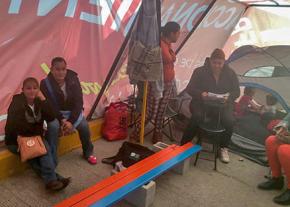A wave of labor struggles in Ciudad Juárez
Workers at several maquiladoras in Ciudad Juárez have set up encampments outside their factories to bring attention to their fight against delayed wages, $8-a-day salaries, sexual abuse, unsafe working conditions, lack of job security and other issues. , a leading member of the Revolutionary Workers Party (PRT, Mexico's section of the Fourth International) and editor of the PRT's newspaper Bandera Socialista, visited the camps and spoke to the workers. This article was first published at the PRT website and was translated into English by Héctor A. Rivera.
"SINCE THE movement began, they've been shifting me around the shop floor, so now I can't communicate with the rest of my coworkers," says a female worker of the Lexmark, the American corporation that produces toner and printer equipment in its maquiladora in Ciudad Juárez. "The supervisor told me that he was shifting me around because I was a rotten apple, and I was tainting the others," she says, and laughs.
And for good reason. In the last couple of weeks, for the first time in years, male and female workers in several maquiladoras have conjured old ghosts--ghosts supposedly slain by progress--that the government's neoliberal reforms had sought to banish. These are the ghosts of work and exploitation, the ghosts of those who have nothing to sell but their labor.
The reality behind the sea of commodities, (smart?) phones, computers and circuits is that they are made by flesh-and-blood people, although it might not seem like it.
Ciudad Juárez was taken by surprise in the last couple of weeks when a new wave of labor struggles emerged in the maquiladoras at CommScope, Lexmark, Eaton Aerospace and Foxconn. These struggles have been demanding wage increases, protection of workers, an end to abuse at the plant, the rehiring of fired workers, and independent unions, separate from corrupt and undemocratic labor bodies like the Confederation of Mexican Workers (CTM) and the Regional Confederation of Mexican Workers (CROM).

Although the coldest part of the year is yet to come, you can already feel the low temperatures and cold winds. Nonetheless, workers have set up improvised occupations outside the maquiladoras. These encampments are composed of tarps and tents, secured by rocks and warmed by improvised fire pits.
During these past days of struggle, faced with threats and pressure from the bosses, the various occupations have received broad solidarity from the people of Juarez. They have received blankets, coffee, beans and firewood for the pits. Workers from the same maquiladoras as the occupiers have made secret deliveries of milk or water, and a few have been reprimanded for doing so.
In many cases, the workers--most of them women--divide their days between their shifts in the maquiladoras and their shifts in the encampments. "Right after the graveyard shift at the camp, I walk to the plant, and I go to work to cover my shift there," says another worker.
THE LIST of abuses and grievances committed by the bosses is long and outrageous. The workers have the cost of food deducted from their pay, and they are only allowed to consume what the company sells, which is nothing more than chips and Coca-Cola. One of the workers told me:
We have eight-hour shifts, and until a few years ago, we had chairs and stools to sit on. But the manager went on a trip to China, and there, they told him that if we worked standing up, we would be more productive. So now we work on our feet, without being able to move. My legs are now full of varicose veins, and a few days ago, I fell getting out of bed and got a huge bruise.
At one of the camps, a woman recounts, "They show us video after video of the working conditions in China, where workers' beds are meters away from their work stations, and they tell us, 'See how they work there? You're lucky--you should be thankful you are allowed to go home.'" Meanwhile, the son of one of the workers on the picket line draws and, dismayed, looks for a different-colored pen.
To avoid losses during times of low demand, the company gives workers "vacations" without warning. Management just tells them that they will be taking the next week off. However, when workers ask for vacation ahead of time, their requests are denied.
At Eaton, for example, there are stages in the production process where workers have to work with chemicals at high temperatures, and then have to shift to freezing water. This generates arthritis and pain in workers' hands, but the company doesn't take responsibility for any of this.
Similarly, at Lexmark, workers are exposed to chemicals used in making ink toner, but they don't have protection of any kind. When workers ask for better conditions, in the best of cases, the companies remain indifferent, but in most cases, they respond with harassment and threats.
In the coming weeks, we will see the results of the workers' demands for new unions. This is the first step in their fight for contracts. However, this first step comes after a long struggle in which workers, mostly women, from different maquiladoras came together under the umbrella of independent labor organizations that do look out for the interests of workers, since these organizations are led by the rank and file.
What we have to do now is show solidarity of all kinds to these striking workers who have said "enough!" One way to show solidarity is to spread the news of their struggle against layoffs and to make sure these struggles are transformed into victories. These fights can become the precursor to the dignified labor movement that we need to uplift a battered workforce.
A woman from the camp reminds us: "They can call us rotten apples if they want, but after apples rot, their seeds appear."
Translation by Héctor A. Rivera


